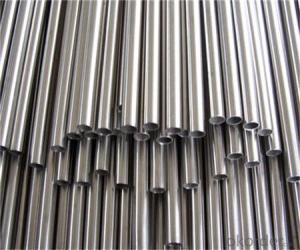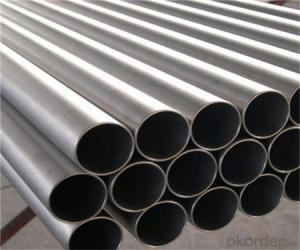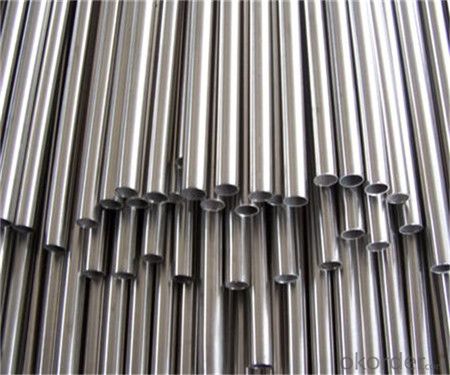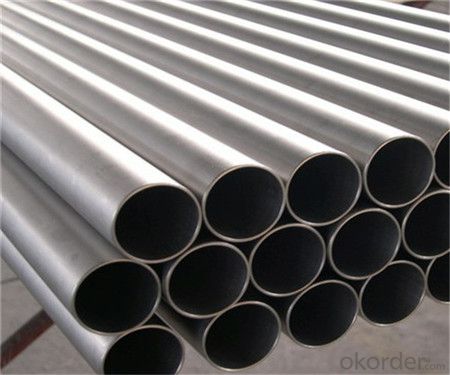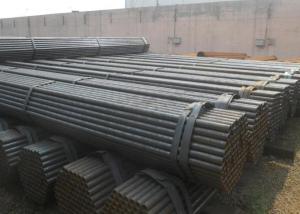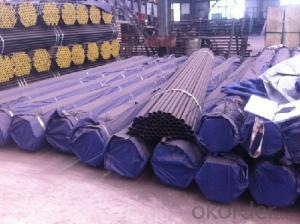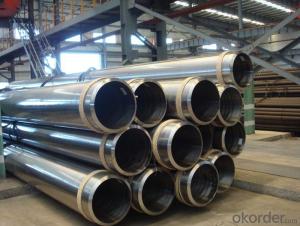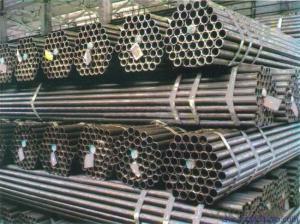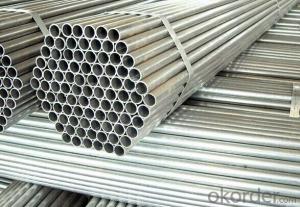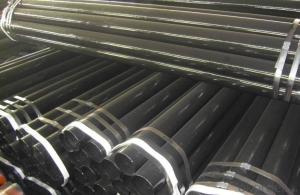Professional Welded Steel Tube/Pipes famous company
- Loading Port:
- Tianjin
- Payment Terms:
- TT OR LC
- Min Order Qty:
- 30 m.t.
- Supply Capability:
- 9000 m.t./month
OKorder Service Pledge
OKorder Financial Service
You Might Also Like
Product Description:
1、Structure of Welded Steel Tube ASTM DIN1829:
Welded Steel Tube is formed by drawing a solid billet over a piercing rod to create the hollow shell. We are company that have many years experience and professional manager team and engineer team and sales team, sure we will provide you high quality of welded pipe and professioanl service.
2、Main Features of the Seamless Pipe ASTM DIN1829:
• High manufacturing accuracy
• The higher strength
• The small inertia resistance
• Strong heat dissipation ability
• Good visual effect
• Satisfy price
3、Seamless Pipe ASTM DIN1829 Specification:
Standard | GB, DIN, ASTM ASTM A106-2006, ASTM A53-2007 |
Grade | 10#-45#, 16Mn 10#, 20#, 45#, 16Mn |
Thickness | 8 - 33 mm |
Section Shape | Round |
Outer Diameter | 133 - 219 mm |
Place of Origin | Shandong, China (Mainland) |
Secondary Or Not | Non-secondary |
Application | Hydraulic Pipe |
Technique | Cold Drawn |
Certification | API |
Surface Treatment | factory state or painted black |
Special Pipe | API Pipe |
Alloy Or Not | Non-alloy |
Length | 5-12M |
Outer Diameter | 21.3-610mm |
Grade | 20#, 45#, Q345, API J55, API K55, API L80, API N80, API P110, A53B |
Standard | ASME, ASTM |
4、Packaging & Delivery
Packaging Details: | seaworthy package,bundles wrapped with strong steel strip |
Delivery Detail: | 15-30days after received 30%TT |
5、 FAQ of Welded Steel Tube Steel Pipes:
①Quality
Our products are manufactured strictly according to national and internaional standard, and before delivered out we always take a test
on every pipe . If necessary we could provide our quality certifications and all kinds of testing report,.
Guaranteed: If products’ quality don’t accord to discription as we give or the promise before you place order, we promise 100% refund.
②Price
we are factory and be able to give you lowest price below market one, and we have a policy that “ for saving time and absolutely honest business attitude, we quote as lowest as possible for any customer, and discount can be given according to quantity”,if you like bargain and factory price is not low enough as you think, just don’t waste your time.Please trust the quotation we would give you, it is professional one.
Why us?
We can provide both low price and good quality especially we are belong to national company could provide you the best sell-after service .Additionally, we can also offer professional products inquiry, products knowledge train(for agents), smooth goods delivery, exellent customer solution proposals.Our service formula: good quality+good price+good service=customer’s trust
Our Advantages:
1) Fast Delivery: lot of high quality steel pipe in stock lot of factory to produce
2) Quality Assured: Strictly acc. To International standard with System ISO certification
3) Good Service: supplied professional technical guide free of charge at anytime;
4) Reasonable Price: to be better support your business;
SGS test is available, customer inspection before shipping is welcome, third party inspection is no problem.
images of products:
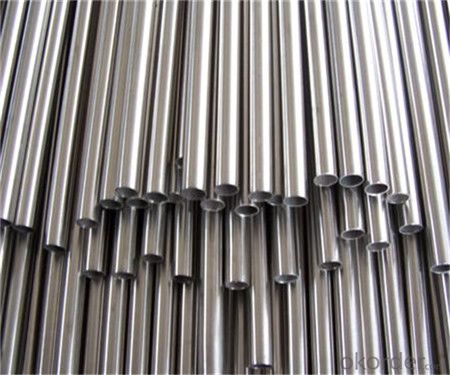
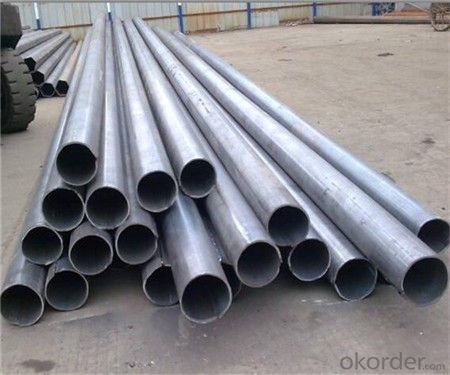
Looking forward to doing the corporation with you
Any question, kindly feel free to contact us !
- Q: What is the average lifespan of steel pipes in different applications?
- The average lifespan of steel pipes in different applications can vary depending on various factors such as the quality of the steel, the environment in which the pipes are used, and the maintenance and care they receive. In general, steel pipes used for water supply lines can have an average lifespan of around 50 to 70 years. This is because these pipes are typically made of high-quality steel and are subject to less corrosive environments. However, factors such as water chemistry, soil conditions, and the presence of corrosive substances can significantly influence the lifespan of these pipes. For steel pipes used in industrial applications such as oil and gas pipelines, the average lifespan can range from 20 to 50 years. These pipes are exposed to more aggressive environments, including high temperatures, pressure, and corrosive substances. Regular inspection, maintenance, and corrosion protection measures can help extend their lifespan. In construction applications, steel pipes used for structural purposes can have an average lifespan of 50 to 100 years or more. These pipes are typically designed to withstand heavy loads and are often protected by coatings or insulation to prevent corrosion. It's important to note that these are average lifespans and individual pipes may have shorter or longer lifespans depending on the specific conditions they are exposed to. Regular inspections, maintenance, and timely repairs or replacements when necessary can help ensure the longevity of steel pipes in different applications.
- Q: What is the maximum allowable deflection for steel pipes?
- Industry standards and design codes typically determine the maximum allowable deflection for steel pipes. These regulations specify the acceptable limits of deflection to guarantee the pipes' structural integrity and functionality. The maximum allowable deflection can vary, depending on factors like pipe diameter, wall thickness, material properties, and the application type. To determine the specific maximum allowable deflection for a particular steel pipe application, it is crucial to reference relevant standards and codes such as the ASME B31.3 code for process piping or AWWA standards for water transmission and distribution pipes. Adhering to these guidelines ensures the safe and efficient operation of steel pipes in various industries and applications.
- Q: How are steel pipes used in LNG terminals?
- Steel pipes are used in LNG terminals to transport liquefied natural gas from storage tanks to processing facilities or to ships for export. These pipes are highly durable and can withstand the extreme cold temperatures of LNG, ensuring safe and efficient transportation of this valuable energy resource.
- Q: Can steel pipes be used for the construction of railway tracks?
- No, steel pipes cannot be used for the construction of railway tracks. Railway tracks require specially designed rails made of steel, which are laid on sleepers or ties and secured with fasteners to provide stability and support for trains. Steel pipes do not possess the necessary shape or strength required for this purpose.
- Q: Can steel pipes be used for heating and cooling systems?
- Yes, steel pipes can be used for heating and cooling systems. Steel pipes are commonly used in HVAC (heating, ventilation, and air conditioning) systems due to their durability, strength, and resistance to high temperatures. They are especially suitable for transporting hot water or steam for heating purposes and can also handle the circulation of chilled water for cooling systems.
- Q: What is the fatigue strength of steel pipes?
- The fatigue strength of steel pipes refers to the maximum stress level that the pipes can endure without experiencing fatigue failure or damage over a given number of stress cycles. It varies depending on factors such as the steel composition, manufacturing process, pipe dimensions, and environmental conditions.
- Q: What's the gate number of the precision steel pipe?
- Precision steel pipe refers to the high precision steel pipe, the wall thickness and internal and external diameter can be controlled within 10 wire tolerance range
- Q: What are the common methods for cleaning the inner surface of steel pipes?
- There are several common methods for cleaning the inner surface of steel pipes. Some of the most widely used methods include: 1. Mechanical Cleaning: This method involves the use of mechanical tools such as wire brushes, scrapers, or abrasive pads to physically remove debris, rust, or scale from the inner surface of the steel pipe. This method is effective for removing loose or loosely adhered contaminants. 2. Chemical Cleaning: Chemical cleaning involves the use of acidic or alkaline solutions to dissolve or loosen stubborn deposits, rust, or scale on the inner surface of steel pipes. The solution is usually circulated through the pipe for a specific period of time, allowing the chemical to react and break down the contaminants. This method is often used when mechanical cleaning is not sufficient. 3. High-Pressure Water Jetting: In this method, high-pressure water is directed through a nozzle into the steel pipe, effectively removing debris, rust, or scale from the inner surface. The force of the water jet helps dislodge and flush out the contaminants. This method is particularly efficient for cleaning pipes with complex geometries or hard-to-reach areas. 4. Shot Blasting: Shot blasting involves the use of high-speed abrasive particles propelled against the inner surface of the steel pipe to remove rust, scale, or other contaminants. This method is commonly used for larger pipes or pipes with heavy deposits. It provides a thorough and uniform cleaning by removing the surface layer of the steel along with the contaminants. 5. Ultrasonic Cleaning: Ultrasonic cleaning uses high-frequency sound waves to create microscopic bubbles in a cleaning solution. These bubbles implode upon contact with the inner surface of the steel pipe, effectively loosening and removing contaminants. This method is particularly effective for cleaning small-diameter pipes or pipes with intricate details. It is important to note that the selection of the cleaning method depends on various factors such as the type and extent of contamination, pipe size and geometry, and the desired level of cleanliness. Additionally, proper safety measures should always be taken when performing any cleaning method to ensure the protection of workers and the integrity of the steel pipes.
- Q: What are the common applications of seamless steel pipes?
- Due to their unique properties, seamless steel pipes are widely used in various industries. Here are some of the most common applications: 1. The oil and gas industry extensively utilizes seamless steel pipes for transporting oil, gas, and other fluids. These pipes are preferred because of their high strength, durability, and resistance to corrosion, making them suitable for harsh environments. 2. Seamless steel pipes are extensively used in construction projects, such as building, bridge, and tunnel construction. They are ideal for structural applications due to their ability to withstand heavy loads and provide excellent strength and stability. 3. The automotive industry relies on seamless steel pipes for manufacturing automotive parts, including exhaust systems, engine components, and hydraulic systems. These pipes offer high strength, reliability, and resistance to heat, making them suitable for demanding automotive applications. 4. Various mechanical and engineering applications benefit from the usage of seamless steel pipes. They are commonly used for carrying fluids, gases, and steam, as well as for transmitting power in machinery and equipment. 5. Power plants extensively utilize seamless steel pipes for transporting steam and hot water. These pipes are capable of withstanding high pressure and temperature, making them ideal for power generation applications. 6. The petrochemical industry heavily relies on seamless steel pipes for transporting chemicals, gases, and liquids. These pipes have excellent resistance to corrosion, which is essential when dealing with hazardous and corrosive substances. 7. The mining industry utilizes seamless steel pipes for various applications, including the transportation of slurry, water, and other mining-related fluids. These pipes offer durability, reliability, and resistance to abrasion, making them suitable for the challenging mining environment. 8. The aerospace industry finds applications for seamless steel pipes in manufacturing aircraft components, such as hydraulic systems, fuel lines, and structural parts. These pipes provide a high strength-to-weight ratio and resistance to extreme temperatures and pressure. Overall, seamless steel pipes play a crucial role in a wide range of industries. Their exceptional properties, including strength, durability, resistance to corrosion and high temperatures, make them an essential component in various industrial processes and infrastructure development.
- Q: Are galvanized steel tubes the same as degaussing steel tubes?
- Also known as galvanized steel pipe, hot galvanized and galvanized two kinds, hot galvanized, zinc coating thickness, with uniform coating, adhesion, and long service life. The cost of galvanizing is low, the surface is not very smooth, and the corrosion resistance of itself is much worse than that of galvanized pipe.
Send your message to us
Professional Welded Steel Tube/Pipes famous company
- Loading Port:
- Tianjin
- Payment Terms:
- TT OR LC
- Min Order Qty:
- 30 m.t.
- Supply Capability:
- 9000 m.t./month
OKorder Service Pledge
OKorder Financial Service
Similar products
Hot products
Hot Searches
Related keywords
